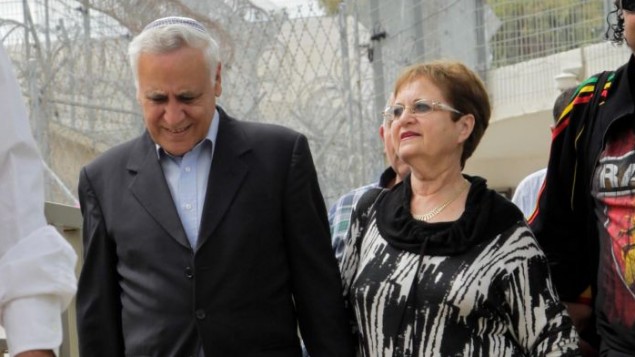April 15, 2016

The Israeli Prisons Service has reportedly placed former President Moshe Qatsav on suicide watch after the country’s parole board rejected the Iranian-born Qatsav’s appeal for early release for good behavior.
Qatsav, 70, was convicted December 30, 2010, of two counts of rape, among other related charges. He began serving his sentence in December 2011, and is slated for release in December 2018.
He had asked the parole board to cut one-third off his seven-year sentence, which would have meant his release in the coming weeks. The board spent 13 hours reviewing Qatsav’s case, then unanimously turned him down.
In the hearing, the ex-president, at times in tears, continued to maintain his innocence. The board cited that refusal to take responsibility as the main reason for its rejection of a parole, although in Israel it is the norm to reduce sentences by a third for good behavior.
In the public section of its report, the parole board noted Qatsav’s troubled mental state.
“In front of us is a prisoner who denies the crimes that he committed, who continues to claim his innocence, despite the court ruling in his matter, and continues to spend time trying to prove his innocence, as though there had been no legal process,” the decision read.
“The board took note that the prisoner sees himself as a victim … and is busy solely with himself, his needs, his loss, and the price that he and his family have paid. Even in light of questions from the board, the prisoner didn’t show regret and/or empathy for the victims of the crime, but once again noted the heavy price he has paid and is paying,” it said.
Qatsav spoke “obsessively” about his own innocence, the board said.
According to Channel 10, the Prisons Service, too, is worried about his mental state, and had been preparing for a possible rejection of his request. The service is considering assigning a prison guard to accompany Qatsav around the clock in order to prevent any attempt to take his own life.
Qatsav will also be given psychological counseling.
Qatsav was born in Yazd and came to Israel when he was about six years old. He lived in a poverty-ridden refugee camp for years. His life story was a rags-to-riches tale of the struggle of a Middle Eastern Jew to make his way in a society that was run by European Jews, who commonly looked down upon the Middle Eastern Jews among them. He was the first Iranian-born Jew to become a cabinet minister.
At his trial and since, Qatsav maintained that he had consensual sex with the two women and was not guilty of rape. The trial court and appeals court rejected his thesis.
The former president’s attorney, Zion Amir, suggested the parole board was swayed by public sentiment against Qatsav. “I very much regret that in our society decision makers are enslaved to outside moods that lead to decisions like this,” Amir said.
Qatsav can make another plea for parole in six months.
The decision to keep Qatsav in prison was met with praise from many public officials and victims’ groups.
“This is a clear message to society that the justice system will not tolerate at any level any disregard for crimes against women, especially if the culprit is a senior public figure,” said Aida Touma Sliman, who heads the Knesset Committee on the Status of Women and Gender Equality. “There is no parole board that can deduct one-third of the pain from the women whom Qatzav hurt.”
Qatsav, who has served four years and four months, had told his close friends that he was “not especially optimistic” that he would be granted the early release, according to Channel 2 news.
Speaking at the hearing, a representative of the Justice Ministry expressed the ministry’s opposition to Qatsav’s early release. Qatsav had not proven “he was worthy of an early release,” primarily due to his continued refusal to accept the court’s verdict and take responsibility for his crimes, the state representative said. He has also refused to undergo rehabilitation programs in the prison, he said.
Qatsav was a member of the Likud Party, the party that now leads the government and the party of Prime Minister Binyamin Netanyahu.
The parole request triggered a firestorm of criticism, including from at least one of Qatsav’s victims.
If he went free, “it would be unprecedented in Israel, and would send a very negative message, both about women and about sex offenders,” Odelia Karmon, who was assaulted by Qatsav in the early 1990s, told Army Radio before the rejection was handed down. Karmon worked for Qatsav when he served as transportation minister from 1988 to 1992.
Early parole is very common in the Israeli prison system, with a majority of prisoners managing to obtain the standard one-third reduction for good behavior.
The Prisons Service said Qatsav’s behavior as a prisoner has been above reproach.
If his second parole request is denied later this year, Qatsav will be able to appeal for a pardon from President Reuven Rivlin. The two are Likud Party colleagues who served in the Knesset together for years before Qatsav won the presidency.
